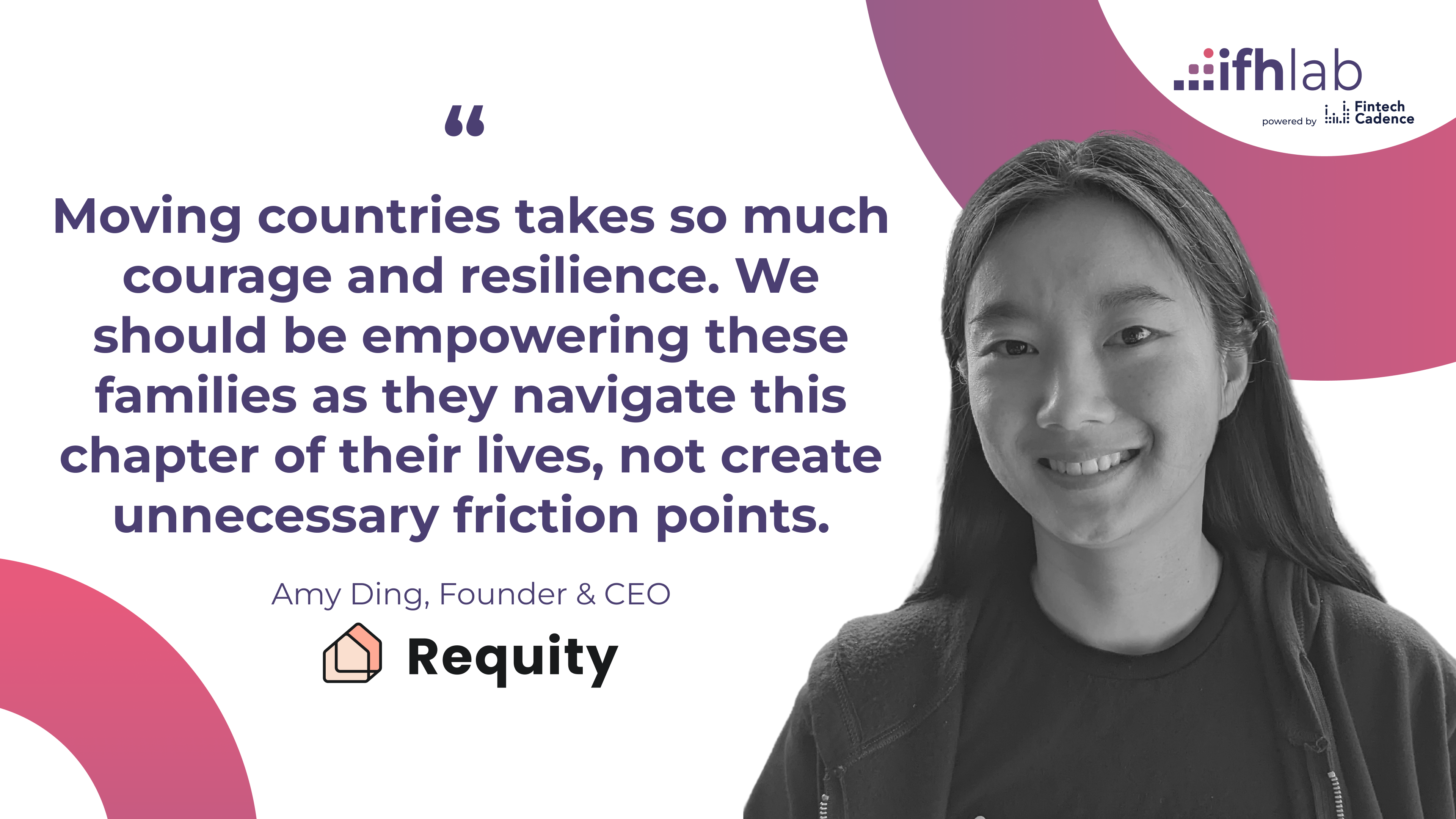Interview between Molly Willats, Head of Program Development for Financial Health at Fintech Cadence and Amy, Founder and CEO at Requity Homes, a current fintech in our IFH Lab 2022 Cohort.
Homeownership is one of the surest ways to build individual and generational wealth, but it is becoming increasingly inaccessible to many Canadians. Whether it’s thin or bad credit preventing you from qualifying for a mortgage, or difficulty saving for a downpayment as the cost of living rises – many Canadians have the ability to afford mortgage payments, but face barriers to entry that can feel insurmountable. Requity Homes founder Amy Ding is on a mission to open new pathways to homeownership using technology.
Amy joined us to talk about Requity Homes, the importance of persistence and opportunities in fintech.
Tell us more about Requity Homes and the inspiration behind the idea.
Requity Homes is a tech-enabled rent-to-own real estate company that aims to create a fair and flexible alternative path to homeownership. Through our rent-to-own program, we allow renters to pick a dream home today, build their down payment one month at a time, and buy back the home from us within three years at a guaranteed price.
Home ownership is something that’s close to my heart. I still remember having to move 7 times during my first two years in Canada. That experience just reinforced how important home ownership really is. Rising home prices, stagnating wages, and tightening mortgage requirements have left many unable to achieve their home ownership dreams. About two years ago I saw the opportunity in Canada to help families who could afford the cost of a mortgage, but for whatever reason found themselves unable to get one. That’s when I decided to quit my corporate job and started Requity Homes.
The decision to leave a stable corporate job to build a company is a big step that an entrepreneur has to grapple with at some point. What energizes you to pursue your startup even when things aren’t going as planned?
For me, it’s our mission: helping 10,000 families get into homeownership. I started the company because I felt there was a gap in the market. How we purchase a home hasn’t changed in decades and the default has always been save up then get a mortgage. Unfortunately, for too many families the path to homeownership is no longer as a straightforward as it once was, and I knew there had to be a better way. That’s why I started Requity Homes.
As an immigrant myself, it blows my mind how difficult it continues to be
to access basic financial products in this country.Amy Ding
What is one thing you’ve learned so far or taken away since joining IFH Lab?
I’ve learned so much from the cohort! We’re all working on really interesting problems that have consumers at the heart of everything. Across the banking and financial ecosystem, you’re finding similar friction points that are leaving many Canadians and newcomers underserved. What struck me going through the program was the similarities of some of the problems we’re trying to solve. Even though one company could be focused on credit, another on savings, ourselves on homeownership, they all highlighted opportunities that the current Canadian marketplace fails to address and that’s really exciting.
Speaking of these gaps or opportunities that the marketplace is currently failing to address, what is one change you would like to see in your industry?
I really think there needs to be more products directed at newcomers. As an immigrant myself, it blows my mind how difficult it continues to be to access basic financial products in this country. Moving countries takes so much courage and resilience. We should be empowering these families as they navigate this chapter of their lives, not create unnecessary friction points. More efforts need to be made to bridge the gap in the quality and cost products and services.
What advice would you give to someone who is thinking about starting their own startup?
Just do it. I think the pandemic has helped a lot of people focus on what’s really important to them. There’s no better time than the present to get started, and while I don’t think you necessarily need to jump in right away and quit your job and go at it full time, you can always start setting yourself up for that goal. If you don’t have enough saved up to take that leap yet, figure out how much you need and plan backwards towards an end date. Figure out what steps you can take now that’ll help out later.
I think that’s great advice - sometimes it can feel like entrepreneurship needs to be all or nothing, but it’s ok to take it one step at a time. And what is the best career advice you’ve received?
Be persistent. One thing I’ve found is a lot of focus is placed on innate talent, when in reality persistence trumps talent most of the time. While talent might open opportunities for you, having the drive to execute and run with things differentiates good from great.


